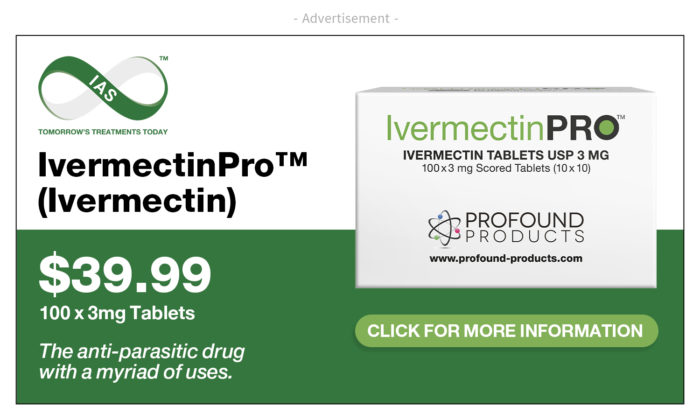
Ivermectin and CV19
May 7th, 2021By Will Block
Given all the COVID-19 suffering, the promise for relief, and the growing vaccine side-effects, is it any wonder that a fervent search for other drugs and supplements is growing?
Dr Ryan Cole is the CEO/Medical Director of Cole Diagnostics and has conducted over 100,000 COVID-19 tests in the past year alone. Cole Diagnostics is an independent IDAHO lab.
Dr. Cole has this to say about vitamin D3 (hereafter named as vitamin D):
- Coronavirus infections are seasonal.
- In reality, there are only low vitamin D seasons.
- Inflammatory (cytokine storms), are present in all COVID-19 cases and cannot be controlled without adequate vitamin D levels.
- Massive numbers of Americans have low vitamin D levels.
- 96% of ICU patients are vitamin D deficient.
- You cannot synthesize vitamin D from sunlight during fall and winter at 35-degrees north and above.
- If you live in northern climates, you are immune suppressed if you do not supplement with vitamin D during fall and winter.
- Scandinavian countries (Finland, Norway, Sweden, Denmark) test their citizens twice a year for vitamin D and fortify 35 foods with vitamin D.
- But our population is left vulnerable to any seasonal viral infection- without a public health program to promote vitamin D adequacy.
- There is not social disparity of care, but darker skin pigmentation which inhibits sunshine vitamin D synthesis in the skin.
- Fauci says he personally takes 8,000-9,000 units of vitamin D per day. Why has this has not become a public health message?
- The top three public health messages should be:
- vitamin D
- vitamin D
- vitamin D
Ivermectin Arrives
Ivermectin fits the treatment bill. Four billion doses of Ivermectin have safely been taken. Of the half million COVID-19 deaths in North America, there would be 375,000 less deaths if Ivermectin were administered! Public health officials may have blood on their hands. 100% of Ivermectin treated patients don’t get ill. This works for all genetic variants.
Pre-Covid Cocktail
For patients desiring protection before possible exposure to COVID-19, such as travel into high-risk areas, a combination of Ivermectin, zinc, vitamin C, and vitamin D is recommended as part of the safety plan.
Dosages are as follows:
Ivermectin treatment under supervision, is typically being dosed at 0.2 mg per kg bodyweight, each 24-hour period. Another way to calculate your personal treatment dose; divide your body weight in pounds by 33. That’s how many Ivermectin 3 mg tablets you should take in one day. Take that many tabs on days 1, 3, 10, 17, and 25 (one month supply). In addition:
Zinc Sulfate 50 mg/daily
Vitamin C 3-5,000 mg/daily
Vitamin D3 4-5,000 IU/daily
Ivermectin Enters the Field
A recent development in Honduras by several groups of physicians and multidisciplinary committees is that the government create and establish a new public health policy to ensure that the healthy adult population all receive weekly doses of 12-18mg Ivermectin.
Recently, several groups of physicians and multidisciplinary committees have recommended
[Editor’s note: Those with ‘lessor’ concerns, are typically availing themselves of a prophylactic dose of ivermectin as little as 3 mg per week].
This is because there are clinical and laboratory study results that justify its use for prophylaxis and to lower the viral load of SARS-CoV-2, which is the virus that causes COVID-19.
The Problem of “Experts”
And the public and the news media always take great comfort that an “expert” gave them this idea based on the “science.” Trouble is, you can always find another “expert” with equal credentials who will offer a completely contradictory perspective. Also, the Honduran government may not parallel other Latin-American countries, let alone European or SE Asian nations.
Ivermectin as a Wonder Drug
Ivermectin is highly effective against many microorganisms including some viruses and has a huge potential to treat a range of diseases. It has been referred to in some circles as a “wonder drug”, due to its antoviral, antimicrobial and anti-cancer properties. Recent comprehensive systematic reviews have shown that Ivermectin’s antiviral properties also appear to work on RNA viruses such as dengue, yellow fever, Zika, West Nile disease etc. An RNA viruses presents when the virus has ribonucleic acid (RNA) is its genetic material – COVID-19 is an RNA disease!
When the body becomes infected with infection or suffers an injury, it has an intrinsic defense mechanism – inflammation! Chronic inflammation triggers cellular and humoral responses (where antibody molecules are secreted by plasma cells) and allows the host to recover, whereas acute inflammation can be dangerous and lead to cytokine storms (where too many cytokines are released into the blood at a high rate) – this can lead to a number of health problems including widespread tissue damage, dangerously high fevers, multi-organ failure and even death.
A recent review/study from the CSIR-Centre for Cellular and Molecular Biology, India, emphasized how anti-inflammatory drugs, of which Ivermectin is one, may work against both cancer inflammation and the inflammation caused by RNA viruses such as COVID-19.
FDA Prevails … In Error
The FDA does not approve Ivermectin for COVID-19, owing to a variety of possible side-effects. Ha! But this does not include vaccines, which ironically are proving to have many potentially harmful side effects, including blood clots for AstraZenica’s vaccine.
Whilst we are aware that cancer is still the second disease associated with high mortality rates worldwide, mortality rates associated with COVID-19 are robust. Obviously in regard to COVID, these rates are from the past year alone, whereas mortality rates in cancer victims are often observed over periods after illness ranging from months to years.
Overlapping Inflammatory Mechanisms
Cancer and COVID-19 share overlapping inflammatory mechanisms, so it may be that by repurposing some existing anti-cancer / anti-inflammatory drugs will help to lower mortality rates. Some researchers propose potential chemotherapeutic agents to work with inflammatory mechanisms. We have also reviewed the repercussions of anti-inflammatory drugs such as glucocorticoids and hydroxychloroquine with zinc or antiviral drugs such as Ivermectin, against SARS-CoV-2 induced cytokine storm.3
Ivermectin Treats COVID-19
A new double-blind study has determined that Ivermectin is an efficacious treatment for mild COVID-19.4 Conducted in Cali, Colombia, a total of 476 adult patients with mild, symptomatic, laboratory-confirmed COVID-19 for 7 days or fewer were randomly selected from the state health department electronic database. These patients were enrolled mid-2020 and followed up in December 2020, with the primary outcomes being to have a resokution of symptoms within a 21-day follow up period. Adverse events were also collected.
These 476 patients were randomized to receive either Ivermectin or a placebo; the Ivermectin dosage was 300 μg/ kg of body weight per day for 5 days (n=200) and the placebo was (n=200).
Results showed that:
- Ivermectin group – median time to resolve symptoms was 10 days. By day 21, 82% had resolved symptoms.
- Placebo group – median time to resolve symptoms was 12 days. By day 21, 79% had resolved symptoms.
Comparative Effectiveness
Without a doubt, there is an urgent need to prevent and protect against the damage that COVID-19 can do the body, including lung and systemic inflammation, thrombosis and endothelitis.
A further study to assess the effectiveness of multi-drug therapies against COVID-19 was conducted in Tlaxcala, Mexico.6. This study was to assess the effectiveness of the combination of Ivermectin, Azithromycin, Montelukast and Acetylsalicylic Acid (“TNR4” therapy) and whether taking this prevented against the hospitalization and death of ambulatory COVID-19 cases.
The study itself was conducted across 768 confirmed SARS-CoV-2 cases aged between 18-80 years, all of which had received ambulatory care at the Ministry of Health in Tlaxcala. The group was split; 481 people received the TNR4 therapy and 287 received the placebo. All received follow up home visits, calls during the 14 days of the trial.
The results of the trial were as follows:
- TNR4 group – nearly 85% of people who received the TNR4 treatment recovered within 14 days – this is 3.4 times greater than the comparison group. They had a 81% lower risk of being hospitalized or dying.
- Placebo (comparison) group – 59% of people who received the placebo recovered within 14 days. They had a 75% lower risk of dying or being hospitalized.
Overall, those who received TNR4 therapy showed improved recovery and a lower risk of hospitalization and death.
High Compound Library Screen
Ivermectin has the focus of growing attention in FDA approved studies for parasitic indications in the last 8 years. Ivermectin was first identified in a high throughput compound library screen due to its ability to potently inhibit recognition of the Human Immunodeficiency Virus1 (HIV1) integrase protein by the host importin (IMP) α/β1 heterodimer. Ivermectin binds directly to IMPα to cause conformational changes, preventing it from nuclear importing key viral and host proteins.
Ivermectin has also shown strong antiviral properties in cell culture experiments as discussed above to RNA viruses such as Zika and West Nile viruses, Venezuelan equine encephalitis virus, Chikungunya, pseudorabies virus, adenovirus, and SARS-CoV-2 (which causes COVID-19).
There are over 70 clinical trials underway on a global scale that involve SARS-CoV-2 and Ivermectin; whilst we do not yet have full results, those that are available (as well as retrospective and observational studies) indicate clinical benefit.
There is urgent therapeutic need for COVID-19, a disease for which there are currently no widely effective approved treatments and the emergency-use authorized drugs do not result in significant and widespread patient improvement.
The FDA-approved drug Ivermectin has long been shown to be both an antihelmintic agent, (a group of antiparasitic drugs that expel parasitic worms [helminths]) and a potent inhibitor of viruses such as Yellow Fever Virus.
More Potent Therapeutic Antiviral Dose
One current study with Ivermectin packages it as an orally administrable nanoparticle, the aim of which is for it to serve as a “vehicle”, delivering a more potent antiviral dose. Not only will this study look to demonstrate its antiviral properties, it could also demonstrate Ivermectin’s efficiency in lowering transmission rates, by decreasing expression of viral spike proteins and their receptors, angiotensin-converting enzyme 2 (ACE2). ACE2 targeting and spike protein are features not only of COVID-19, but shared access this class of virus, so this platform technology has the potential to serve as a therapeutic tool for other Coronavirus strains as well.
This study has reported that Ivermectin, when delivering as a targeted nanoparticle, can inhibit nuclear transport activities that are mediated through heterodimers as a possible mechanism of action. It also sheds light on Ivermectin loaded, orally administrable, biodegradable nanoparticles. These can be a potential treatment option for the novel coronavirus through a multilevel inhibition.
Great Burden to Healthcare Worldwide
Viruses such as human cytomegalovirus, human papillomavirus (HPV), Epstein-Barr virus, HIV, and SARS-CoV-2, represent a great burden to human health worldwide.8-9 The FDA-approved anti-parasite drug Ivermectin is also an antibacterial, antiviral, and anticancer agent, which offers more potentiality to improve global public health, and it can effectively inhibit the replication of SARS-CoV-2 in vitro.
A study to identify Ivermectin-related virus infection pathway alterations in human ovarian cancer cells revealed many Ivermectin related proteins were present in these cells. The Gene Ontology analysis also revealed 10 statistically significant cellular components, 13 molecular functions, and 11 biological processes. This was the result of Stable isotope labeling by amino acids in cell culture (SILAC) quantitative proteomics analyzing human ovarian cancer cells that had been treated with Ivermectin20 μmol/L) for 24 hours, against those that hadn’t.
These findings demonstrate the broad-spectrum antiviral property that Ivermectin possesses for COVID-19 treatment in the context of predictive, preventive, and personalized medicine in virus-related diseases.
Screening Identifies Potentially Effective Drugs
The small molecule macrocyclic lactone Ivermectin, approved by the US Food and Drug Administration for parasitic infections, has received renewed attention in the last eight years due to its exciting potential as an antiviral.10
Astonishingly, cell culture experiments show robust antiviral action towards HIV-1, dengue virus, Zika virus, West Nile virus, Venezuelan equine encephalitis virus, Chikungunya virus, Pseudorabies virus, adenovirus, and SARS-CoV-2. This mini-review discusses the case for Ivermectin as a host-directed broad-spectrum antiviral agent for a range of viruses, including SARS-CoV-2.
COVID-19 is a critical pandemic that has affected human communities worldwide and (we repeat) there is an urgent need to develop effective drugs.11 Although there are many candidate drug-compounds that may be useful for treating COVID-19, the evaluation of these drugs is time-consuming and costly. Thus, screening to identify potentially effective drugs prior to experimental validation is necessary.
Numerous drugs were successfully screened, including many known antiviral drug compounds such as sorafenib, sorafenib, alvocidib, mitoxantrone, geldanamycin, fluticasone, and quercetin.12
One thing more … COVID-19 is likely mutating and is turning on younger age groups.13
We will continue to report these scientific interventions, missteps, and discoveries with discernment.
References
1. Heidaryz F, Gharebaghi R. Ivermectin: a systematic review from antiviral effects to COVID-19 complementary regimen. J Antibiot (Tokyo). 2020 Sep;73(9):5093-602.
- Amere Subbarao S. Cancer vs. SARS-CoV-2 induced inflammation, overlapping functions, and pharmacological targeting. 2021 Mar 15, 1-24.
- Mamkulathil Devasia R, Altaf M, Alrefaei AF. Manoharadas S. Enhanced production of camptothecin by immobilized callus of Ophiorrhiza mungos and a bioinformatic insight into its potential antiviral effect against SARS-CoV-2. J King Saud Univ Sci. 2021 Mar;33(2):101344.
- Caly L, Druce JD, Catton MG, Jans DA, Wagstaff KM. The FDA-approved drug Ivermectin inhibits the replication of SARS-CoV-2 in vitro. Antiviral Res. 2020 Jun; 178:104787. doi: 10.1016/j.antiviral.2020.104787. Epub 2020 Apr 3. López-Medina E, López P, Hurtado IC, et al. Effect of Ivermectin on Time to Resolution of Symptoms Among Adults with Mild COVID-19: A Randomized Clinical Trial. JAMA. 2021 Mar 4; e213071.
- Lima-Morales R, Méndez-Hernández P, Flores YN, et al. Effectiveness of a multidrug therapy consisting of Ivermectin, azithromycin, montelukast and acetylsalicylic acid to prevent hospitalization and death among ambulatory COVID-19 cases in Tlaxcala, Mexico. Int J Infect Dis. 2021 Feb 9; S1201-9712(21)00100-4.
- Jans DA, Wagstaff KM. The broad-spectrum host-directed agent Ivermectin as an antiviral for SARS-CoV-2? Biochem Biophys Res Commun. 2021 Jan 29; 538:163-72.
- Surnar B, Kamran MZ, Shah AS, Dhar S. Clinically approved antiviral drug in an orally administrable nanoparticle for COVID-19. ACS Pharmacol Transl Sci. 2020 Dec 1;3(6):1371-80.
- Pandey S, Pathak SK, Pandey A, Salunke AA, Chawla J, Sharma A, Sharma S, Thivari P, Ratna HVK. Ivermectin in COVID-19: What do we know? Diabetes Metab Syndr. Nov-Dec 2020;14(6):1921-2.
- Li N, Zhao L, Zhan X. Quantitative proteomics reveals a broad-spectrum antiviral property of Ivermectin, benefiting for COVID-19 treatment. J Cell Physiol. 2021 Apr;236(4):2959-75.
- Jans DA, Wagstaff KM. Ivermectin as a Broad-spectrum host-directed antiviral: The Real Deal? 2020 Sep 15;9(9):2100.
- Taguchi Y-H, Turki T. A new advanced in silico drug discovery method for novel coronavirus (SARS-CoV-2) with tensor decomposition-based unsupervised feature extraction. PLoS One. 2020 Sep 11;15(9): e0238907.
- Montoya J, Ugaz C, Alarcon S, et al. COVID-19 in pediatric cancer patients in a resource-limited setting: National data from Peru. Pediatr Blood Cancer. 2021 Feb;68(2): e28610. doi: 10.1002/pbc.28610. Epub 2020 Jul 22.
- Danchin A, Turinici G. Immunity after COVID-19: Protection or sensitization? Math Biosci. 2021 Jan; 331:108499. Text 2,788







